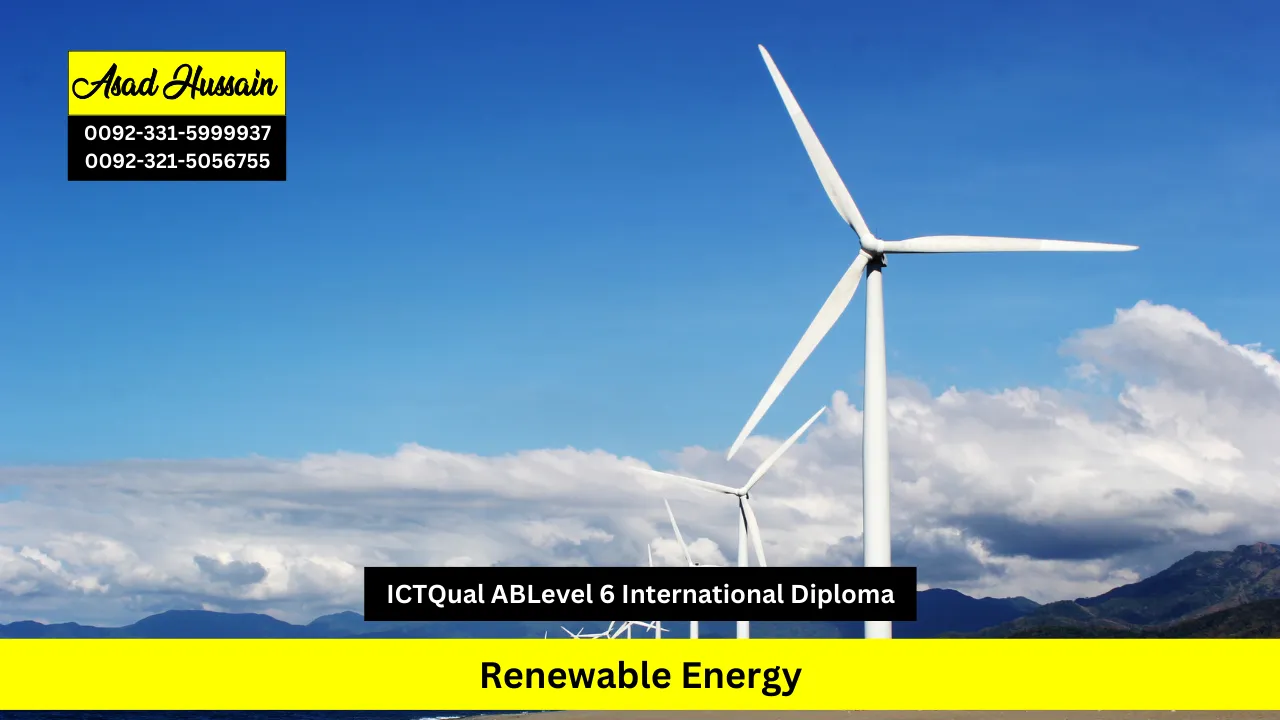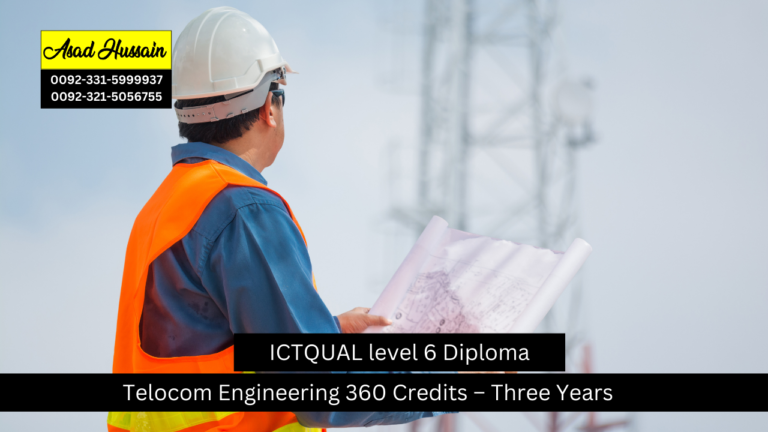The ICTQual ABLevel 6 International Diploma in Renewable Energy is a comprehensive qualification designed to equip learners with advanced expertise in sustainable energy systems, clean technologies, and global energy transition strategies. As the world moves towards carbon neutrality and reduced reliance on fossil fuels, the demand for highly skilled renewable energy professionals has never been greater. ICTQual AB Level 6 International Diploma in Renewable Energy addresses that demand by providing both the technical knowledge and practical competencies required to excel in the renewable energy sector.
The diploma explores a wide range of renewable energy technologies, including solar, wind, hydro, biomass, and emerging clean energy solutions. Learners will study energy efficiency, grid integration, environmental sustainability, project management, and policy frameworks governing renewable energy adoption worldwide. Through a balanced blend of theory and application, students will gain the ability to design, implement, and manage renewable energy projects that meet global standards.
Graduates of this diploma will be well-prepared for roles such as renewable energy engineers, project developers, sustainability consultants, energy analysts, and policy advisors. With its strong focus on innovation, safety, and environmental stewardship, the program provides learners with a competitive edge in one of the fastest-growing industries in the world.
By completing the diploma, learners will gain a globally recognized qualification that not only enhances employability but also opens doors to diverse career opportunities in the clean energy and sustainability sector. This diploma equips individuals with the technical expertise, analytical skills, and strategic insight required to lead renewable energy projects, manage sustainable technologies, and implement innovative solutions to global energy challenges.Graduates will be well-positioned to take on leadership roles in renewable energy companies, government agencies, and environmental organizations, while also contributing meaningfully to the transition towards a low-carbon, sustainable energy future.
Program Highlights
Study Units
Year 1 – Foundation in Renewable Energy
- Principles of Renewable Energy Systems
- Introduction to Sustainable Energy Technologies
- Solar Energy Fundamentals
- Wind Energy Basics and Applications
- Hydroelectric Power Principles
- Biomass and Bioenergy Fundamentals
- Energy Conversion and Storage Basics
- Electrical and Mechanical Principles for Decarbonised Energy
- Health, Safety, and Environmental Awareness
- Laboratory Techniques in Renewable Energy
- Technical Report Writing
- Introduction to Renewable Energy Simulation Software
Year 2 – Intermediate Renewable Energy
- Advanced Solar Photovoltaic Systems
- Wind Turbine Design and Operations
- Hydropower Plant Design and Management
- Biomass Conversion and Biofuel Production
- Energy Storage Systems and Technologies
- Smart Grids and Energy Distribution
- Process Control and Automation in Renewable Energy
- Energy Efficiency and Management Strategies
- Environmental Impact Assessment and Sustainability
- Quality Control and Assurance in Energy Systems
- Project Planning and Technical Communication
- Data Analysis for Renewable Energy Projects
Year 3 – Advanced Renewable Energy
- Advanced Energy Systems Optimisation and Troubleshooting
- Energy Project Management
- Emerging Technologies in Solar and Wind Energy
- Advanced Energy Storage and Battery Technologies
- Smart Grid Integration and Management
- Sustainability and Cleaner Energy Practices
- Risk Assessment and Hazard Analysis in Energy Projects
- Advanced Laboratory Techniques and Field Testing
- Supply Chain and Logistics in Renewable Energy
- Capstone Project in Future Energy Technologies
- Professional Development and Leadership in Energy
- Strategic Decision-Making in Renewable Energy Operations
Meeting the entry requirements for the diploma ensures learners have the academic background, professional experience, and communication skills needed to succeed in this advanced-level program.
Age Requirements
- Applicants must be 18 years of age or older at the time of enrollment in ICTQual ABLevel 6 International Diploma in Renewable Energy.
- Learners are expected to demonstrate maturity, responsibility, and readiness for professional-level study.
Educational Requirements
- A Level 5 diploma, higher national diploma, or equivalent qualification in engineering, energy studies, environmental science, or a related field.
- Strong academic performance in mathematics, physics, or science-related subjects is an advantage.
Professional Experience
- At least two years of relevant work experience in renewable energy, engineering, or environmental management is recommended.
- Industry experience may be considered in place of formal qualifications in specific cases.
English Language Proficiency
- Learners must demonstrate competence in English for technical and academic purposes.
- This can be proven through IELTS, TOEFL, or equivalent certifications, or prior study/work experience in an English-speaking environment.
The ICTQual AB Level 6 International Diploma in Renewable Energy equips learners with comprehensive knowledge, technical expertise, and practical skills required to design, implement, and manage renewable energy systems. Graduates will gain the capability to contribute effectively to sustainable energy projects, clean technology solutions, and energy transition initiatives in diverse professional environments.
Year 1 – Foundation in Renewable Energy
Principles of Renewable Energy Systems
- Understand the basic principles and concepts of renewable energy.
- Analyze different energy sources and their environmental impacts.
- Apply foundational knowledge to evaluate renewable energy potential in various settings.
Introduction to Sustainable Energy Technologies
- Identify key sustainable energy technologies and applications.
- Compare advantages and limitations of different technologies.
- Demonstrate basic understanding of sustainable energy integration.
Solar Energy Fundamentals
- Understand photovoltaic principles and solar energy conversion.
- Calculate energy output and efficiency of basic solar systems.
- Apply theoretical knowledge in laboratory-based solar experiments.
Wind Energy Basics and Applications
- Explain the principles of wind energy generation.
- Evaluate site suitability and turbine performance.
- Conduct basic measurements and analysis of wind energy potential.
Hydroelectric Power Principles
- Understand hydropower generation methods and system components.
- Assess small-scale hydroelectric potential for practical applications.
- Apply safety and environmental considerations in hydropower systems.
Biomass and Bioenergy Fundamentals
- Understand biomass sources and energy conversion methods.
- Evaluate bioenergy applications and environmental implications.
- Conduct simple calculations for energy output from biomass resources.
Energy Conversion and Storage Basics
- Understand fundamentals of energy conversion systems.
- Explore basic energy storage methods, including batteries and thermal storage.
- Apply principles to simple energy storage projects.
Electrical and Mechanical Principles for Decarbonised Energy
- Apply electrical and mechanical concepts to renewable energy systems.
- Perform calculations related to system performance and energy efficiency.
- Integrate theoretical knowledge into practical renewable energy tasks.
Health, Safety, and Environmental Awareness
- Implement safety protocols in energy laboratories and field settings.
- Identify environmental hazards and adopt mitigation measures.
- Ensure compliance with workplace and industry safety standards.
Laboratory Techniques in Renewable Energy
- Develop practical skills in assembling, testing, and maintaining energy systems.
- Conduct experiments to measure performance and efficiency.
- Document and analyze laboratory findings accurately.
Technical Report Writing
- Prepare structured technical reports with clarity and precision.
- Communicate experimental procedures, results, and conclusions effectively.
- Apply professional standards in documentation for academic and industrial purposes.
Introduction to Renewable Energy Simulation Software
- Use simulation tools to model renewable energy systems.
- Analyze performance data and optimize system design in virtual environments.
- Validate simulation results through laboratory or field experiments.
Year 2 – Intermediate Renewable Energy
Advanced Solar Photovoltaic Systems
- Design and implement intermediate-level solar PV systems.
- Evaluate system efficiency, shading effects, and power output.
- Apply simulation tools to optimize solar PV performance.
Wind Turbine Design and Operations
- Understand turbine aerodynamics and structural components.
- Analyze operational performance using real and simulated data.
- Conduct maintenance planning and troubleshooting for wind systems.
Hydropower Plant Design and Management
- Develop skills in hydro plant layout and operational planning.
- Evaluate energy production, efficiency, and environmental compliance.
- Apply project management techniques for small- to medium-scale plants.
Biomass Conversion and Biofuel Production
- Explore biomass-to-energy conversion techniques.
- Assess biofuel quality, efficiency, and environmental impact.
- Apply laboratory and field methods to optimize bioenergy processes.
Energy Storage Systems and Technologies
- Examine advanced battery, thermal, and mechanical storage technologies.
- Evaluate storage system performance and integration with renewable sources.
- Conduct practical exercises in energy storage monitoring and maintenance.
Smart Grids and Energy Distribution
- Understand principles of smart grid technologies and energy distribution.
- Analyze grid performance and renewable energy integration.
- Apply digital tools for monitoring and control of energy systems.
Process Control and Automation in Renewable Energy
- Implement automation systems for energy generation and storage.
- Use sensors, controllers, and SCADA systems in practical projects.
- Evaluate system reliability, performance, and safety.
Energy Efficiency and Management Strategies
- Conduct energy audits and identify areas for efficiency improvement.
- Apply energy management strategies to optimize system operations.
- Analyze energy consumption and cost reduction techniques.
Environmental Impact Assessment and Sustainability
- Evaluate environmental and social impacts of renewable energy projects.
- Develop strategies to minimize negative impacts and improve sustainability.
- Conduct assessments using standardized tools and reporting methods.
Quality Control and Assurance in Energy Systems
- Implement quality management protocols for energy projects.
- Assess system compliance with performance and safety standards.
- Conduct testing, inspections, and corrective actions.
Project Planning and Technical Communication
- Plan renewable energy projects considering time, cost, and resources.
- Communicate project objectives and progress to stakeholders.
- Use professional documentation and reporting practices.
Data Analysis for Renewable Energy Projects
- Collect and interpret energy generation and consumption data.
- Apply statistical tools to evaluate system performance.
- Present analytical findings in reports or presentations.
Year 3 – Advanced Renewable Energy
Advanced Energy Systems Optimisation and Troubleshooting
- Apply optimization techniques to improve energy system efficiency.
- Troubleshoot complex system failures and implement solutions.
- Conduct performance evaluation under real-world conditions.
Energy Project Management
- Develop comprehensive project plans for large-scale renewable projects.
- Apply resource management, budgeting, and scheduling techniques.
- Assess project outcomes using KPIs and performance metrics.
Emerging Technologies in Solar and Wind Energy
- Understand next-generation technologies and innovations.
- Evaluate potential applications in industry and research contexts.
- Apply experimental and simulation-based techniques to emerging systems.
Advanced Energy Storage and Battery Technologies
- Design and implement advanced storage solutions.
- Evaluate battery life, efficiency, and safety in energy systems.
- Integrate storage systems with renewable generation and grid systems.
Smart Grid Integration and Management
- Develop strategies for effective integration of renewable sources into smart grids.
- Monitor and optimize energy distribution using advanced digital systems.
- Assess grid stability, reliability, and efficiency under variable conditions.
Sustainability and Cleaner Energy Practices
- Implement sustainable energy strategies to reduce environmental impacts.
- Evaluate carbon footprint and energy efficiency metrics.
- Develop solutions promoting cleaner and green energy practices.
Risk Assessment and Hazard Analysis in Energy Projects
- Conduct risk assessments for renewable energy installations.
- Apply safety protocols and hazard mitigation measures.
- Develop contingency and emergency response plans.
Advanced Laboratory Techniques and Field Testing
- Perform field measurements and on-site testing of energy systems.
- Apply advanced instrumentation for accurate data collection.
- Document results and provide analytical interpretation.
Supply Chain and Logistics in Renewable Energy
- Understand logistics and procurement for renewable energy projects.
- Optimize supply chain operations to ensure efficiency and cost-effectiveness.
- Evaluate the sustainability of sourcing, transport, and installation processes.
Capstone Project in Future Energy Technologies
- Integrate theoretical knowledge and practical skills in a comprehensive project.
- Conduct independent research and present professional findings.
- Apply project management and technical reporting standards.
Professional Development and Leadership in Energy
- Develop leadership skills for energy project management roles.
- Apply ethical and professional practices in industry contexts.
- Evaluate personal and team performance for continuous improvement.
Strategic Decision-Making in Renewable Energy Operations
- Apply strategic thinking to planning, design, and operational decisions.
- Evaluate trade-offs between cost, efficiency, and sustainability.
- Demonstrate measurable impact of decisions on energy project outcomes.
Upon completion, learners will have the technical expertise, problem-solving skills, and leadership abilities required to excel in renewable energy sectors, smart grid management, and sustainable energy projects globally.
The diploma is designed for individuals with diverse backgrounds who wish to contribute to the global transition towards clean and sustainable energy. Whether from academic, professional, or policy-driven fields, ideal learners share a commitment to advancing renewable energy technologies and practices.
Educational Instructors and Trainers
- Professionals who teach engineering, environmental science, or energy systems.
- Trainers seeking updated knowledge and globally recognized credentials to strengthen their teaching impact.
Environmental Advocates and Activists
- Individuals committed to driving sustainable practices and environmental awareness.
- Advocates looking to gain technical knowledge to support renewable energy campaigns.
Students and Recent Graduates
- Graduates of engineering, science, or environmental studies aiming to specialize in renewable energy.
- Students looking to improve their employability with practical, industry-relevant skills.
Career Changers
- Professionals transitioning from traditional energy or unrelated sectors to renewable energy.
- Learners seeking to align their careers with global sustainability goals.
Policy Makers and Regulators
- Government officials and regulatory professionals responsible for energy legislation.
- Decision-makers aiming to design and implement effective renewable energy policies.
The diploma is ideal for learners who aspire to shape the future of sustainable energy. By attracting instructors, advocates, graduates, career changers, and policymakers, the course creates a diverse learning community focused on achieving real-world impact in the renewable energy sector.







